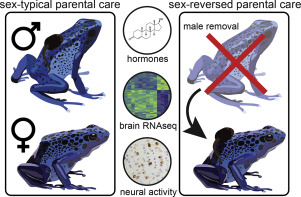当前位置:
X-MOL 学术
›
Horm. Behav.
›
论文详情
Our official English website, www.x-mol.net, welcomes your
feedback! (Note: you will need to create a separate account there.)
Hormonal and neural correlates of care in active versus observing poison frog parents.
Hormones and Behavior ( IF 2.5 ) Pub Date : 2020-01-31 , DOI: 10.1016/j.yhbeh.2020.104696 Eva K Fischer 1 , Lauren A O'Connell 1
Hormones and Behavior ( IF 2.5 ) Pub Date : 2020-01-31 , DOI: 10.1016/j.yhbeh.2020.104696 Eva K Fischer 1 , Lauren A O'Connell 1
Affiliation

|
The occasional reversal of sex-typical behavior suggests that many of the neural circuits underlying behavior are conserved between males and females and can be activated in response to the appropriate social condition or stimulus. Most poison frog species (Family Dendrobatidae) exhibit male uniparental care, but flexible compensation has been observed in some species, where females will take over parental care duties when males disappear. We investigated hormonal and neural correlates of sex-typical and sex-reversed parental care in a typically male uniparental species, the Dyeing Poison Frog (Dendrobates tinctorius). We first characterized hormone levels and whole brain gene expression across parental care stages during sex-typical care. Surprisingly, hormonal changes and brain gene expression differences associated with active parental behavior in males were mirrored in their non-caregiving female partners. To further explore the disconnect between neuroendocrine patterns and behavior, we characterized hormone levels and neural activity patterns in females performing sex-reversed parental care. In contrast to hormone and gene expression patterns, we found that patterns of neural activity were linked to the active performance of parental behavior, with sex-reversed tadpole transporting females exhibiting neural activity patterns more similar to those of transporting males than non-caregiving females. We suggest that parallels in hormones and brain gene expression in active and observing parents are related to females' ability to flexibly take over parental care in the absence of their male partners.
中文翻译:

主动和观察毒蛙父母的护理的激素和神经相关性。
性行为的偶发性逆转表明,行为背后的许多神经回路在男性和女性之间是保守的,可以响应适当的社会条件或刺激而被激活。大多数毒蛙物种(家庭蝇科(Dendrobatidae))都表现出雄性单亲照顾,但在某些物种中观察到了灵活的补偿,当雄性消失时,雌性将接管父母的监护职责。我们调查了在典型的雄性单亲物种“染色毒蛙”(Dendrobates tinctorius)中,性别典型和性别反转的父母关怀的激素和神经相关性。我们首先在典型性护理期间的父母护理阶段中表征了激素水平和全脑基因表达。出奇,与未照顾父母的女性伴侣反映了与男性主动父母行为有关的激素变化和脑基因表达差异。为了进一步探讨神经内分泌模式与行为之间的脱节,我们对女性进行了性逆转的父母照护时,描述了激素水平和神经活动模式。与激素和基因表达模式相反,我们发现神经活动模式与父母行为的主动表现有关,与性别相反的t运输女性表现出的神经活动模式与非照料女性更为相似。我们认为,活跃和有观察力的父母体内激素和脑基因表达的相似性与女性的
更新日期:2020-02-03
中文翻译:

主动和观察毒蛙父母的护理的激素和神经相关性。
性行为的偶发性逆转表明,行为背后的许多神经回路在男性和女性之间是保守的,可以响应适当的社会条件或刺激而被激活。大多数毒蛙物种(家庭蝇科(Dendrobatidae))都表现出雄性单亲照顾,但在某些物种中观察到了灵活的补偿,当雄性消失时,雌性将接管父母的监护职责。我们调查了在典型的雄性单亲物种“染色毒蛙”(Dendrobates tinctorius)中,性别典型和性别反转的父母关怀的激素和神经相关性。我们首先在典型性护理期间的父母护理阶段中表征了激素水平和全脑基因表达。出奇,与未照顾父母的女性伴侣反映了与男性主动父母行为有关的激素变化和脑基因表达差异。为了进一步探讨神经内分泌模式与行为之间的脱节,我们对女性进行了性逆转的父母照护时,描述了激素水平和神经活动模式。与激素和基因表达模式相反,我们发现神经活动模式与父母行为的主动表现有关,与性别相反的t运输女性表现出的神经活动模式与非照料女性更为相似。我们认为,活跃和有观察力的父母体内激素和脑基因表达的相似性与女性的











































 京公网安备 11010802027423号
京公网安备 11010802027423号